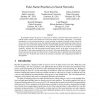Free Online Productivity Tools
i2Speak
i2Symbol
i2OCR
iTex2Img
iWeb2Print
iWeb2Shot
i2Type
iPdf2Split
iPdf2Merge
i2Bopomofo
i2Arabic
i2Style
i2Image
i2PDF
iLatex2Rtf
Sci2ools
102
click to vote
WINE
2010
Springer
2010
Springer
False-Name-Proofness in Social Networks
In mechanism design, the goal is to create rules for making a decision based on the preferences of multiple parties (agents), while taking into account that agents may behave strategically. An emerging phenomenon is to run such mechanisms on a social network; for example, Facebook recently allowed its users to vote on its future terms of use. One significant complication for such mechanisms is that it may be possible for a user to participate multiple times by creating multiple identities. Prior work has investigated the design of false-name-proof mechanisms, which guarantee that there is no incentive to use additional identifiers. Arguably, this work has produced mostly negative results. In this paper, we show that it is in fact possible to create good mechanisms that are robust to false-name-manipulation, by taking the social network structure into account. The basic idea is to exclude agents that are separated from trusted nodes by small vertex cuts. We provide key results on the c...
Related Content
| Added | 15 Feb 2011 |
| Updated | 15 Feb 2011 |
| Type | Journal |
| Year | 2010 |
| Where | WINE |
| Authors | Vincent Conitzer, Nicole Immorlica, Joshua Letchford, Kamesh Munagala, Liad Wagman |
Comments (0)

